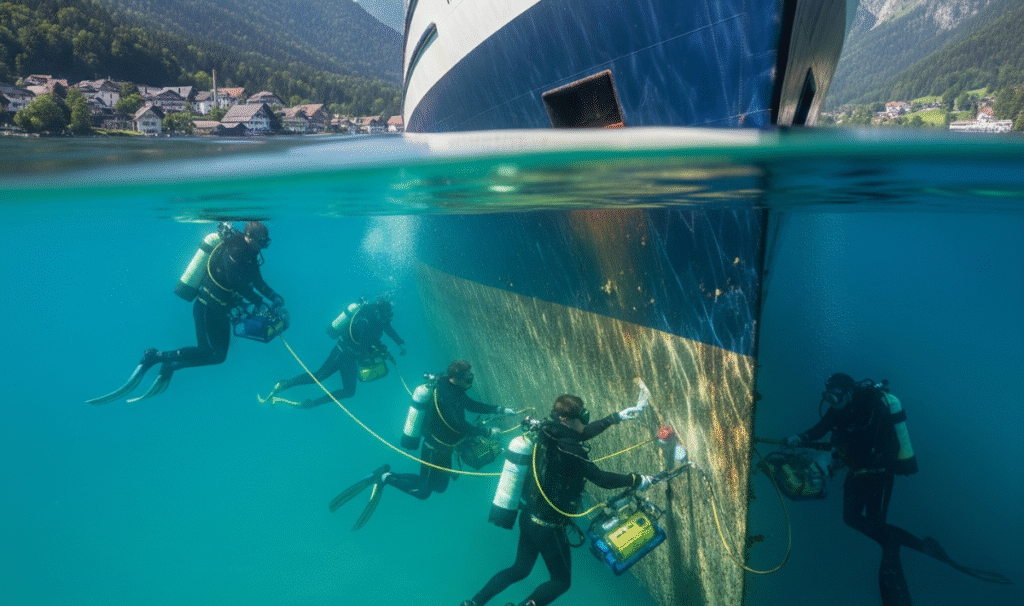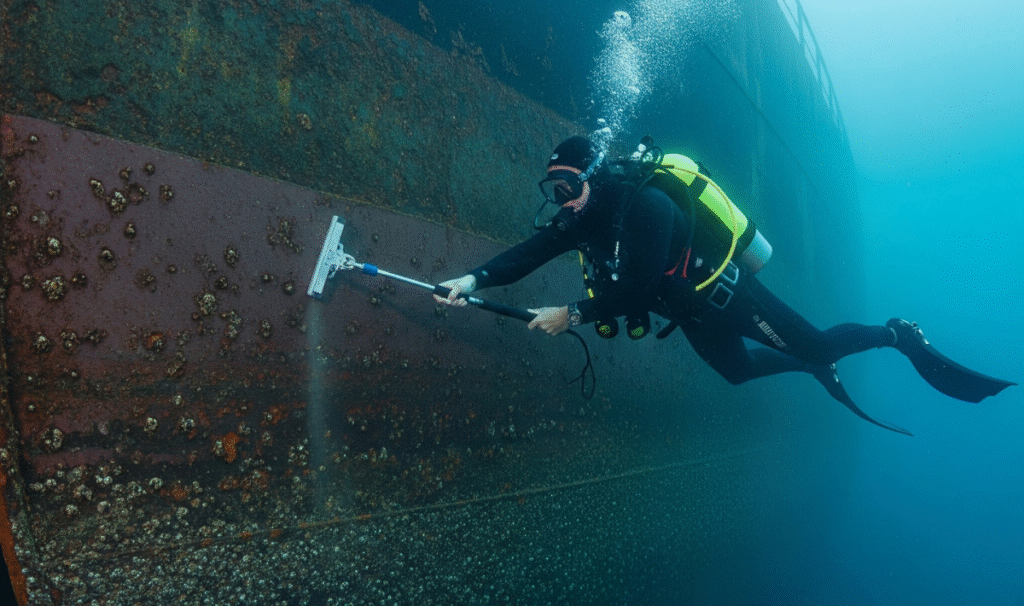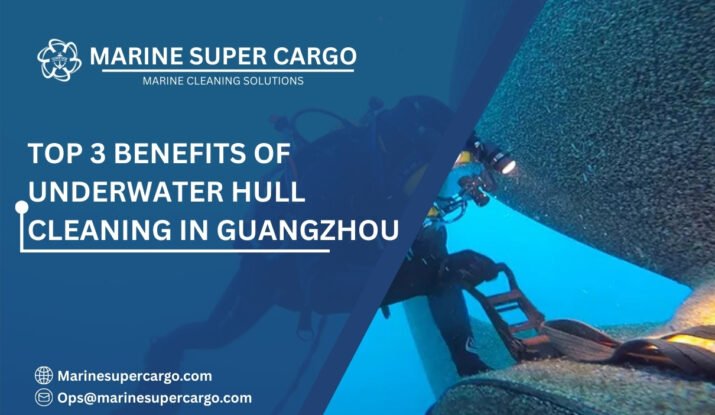When you picture a massive ship cutting across the Pearl River Delta or voyaging through the South China Sea, you might imagine its engines roaring and propellers churning. But what actually determines whether it glides effortlessly or drags like a tired beast is often hidden below the waterline. Yes—we’re talking about the hull.
Marine growth like barnacles, algae, and slime clings to hulls, slowing vessels down, wasting fuel, and even harming the ocean. This is why underwater hull cleaning in Guangzhou has shifted from being just another maintenance job to a critical performance booster. Guangzhou, one of the busiest ports in the world, is the perfect setting to see how regular hull cleaning multiplies a ship’s efficiency and sustainability.
Let’s break down the three key benefits of underwater hull cleaning in Guangzhou and why ignoring it can cost ships far more than just money.
Understanding Underwater Hull Cleaning
What Does the Process Involve?
Imagine scrubbing barnacles off a boat dock—now multiply that effort across the massive steel belly of a commercial vessel. That’s hull cleaning in a nutshell. Using specialized brushes, high-pressure tools, or robotic cleaners, professionals strip marine growth from the ship’s underwater structure.
The result? A hull that’s smooth, hydrodynamic, and far less resistant to motion. Simply put, underwater hull cleaning in Guangzhou helps a ship reclaim its natural agility in water.
Why Guangzhou is a Key Maritime Hub for Hull Cleaning
Guangzhou isn’t just a port; it’s a global powerhouse of trade. With its strategic location near vital sea routes, ships docking here must be in peak condition. The warm waters of South China often encourage rapid biofouling growth, so keeping hulls clean is not a “nice-to-have”—it’s essential for ships operating in and out of Guangzhou.

Boosted Fuel Efficiency and Vessel Performance
How Biofouling Increases Drag
A fouled hull is like running with a backpack full of rocks—it forces the engine to push harder, burning extra fuel for less progress. According to studies shared by imo.org, even light fouling can increase fuel consumption by 10%. Heavy fouling? It can skyrocket costs by 30–40%.
The Immediate Gains of Regular Cleaning
Once underwater hull cleaning in Guangzhou is completed, the difference is astonishing. Ships glide faster, steering feels more responsive, and fuel meters show immediate efficiency. For operators, it’s tangible proof that a clean hull equals a leaner, meaner vessel.
Environmental Protection and Regulatory Compliance
Fighting Biofouling and Invasive Species
Marine growth isn’t just about drag—it’s about spreading invasive species. When ships carry organisms from one port to another, they disrupt ecosystems. Regular underwater hull cleaning in Guangzhou reduces this risk substantially.
Authorities highlight how biofouling management directly supports ecological preservation. The MARPOL Convention underscores the importance of lowering ship-related pollution, making hull cleaning a cornerstone of responsible shipping.
Aligning with International Maritime Standards
Ship owners also have to meet strict maritime standards. Non-compliance can mean hefty fines, insurance hurdles, or even being denied entry at certain ports. Organizations like iaphworldports.org reinforce that clean-hull policies are part of port sustainability initiatives. Regular underwater hull cleaning in Guangzhou ensures vessels stay compliant and respected across global waters.
Reduced Costs and Stronger Structural Integrity
Preventing Corrosion and Coating Damage
Left unchecked, slime and barnacles can gnaw away at a ship’s protective coating. Moisture trapped under fouling speeds up corrosion, weakening steel and reducing lifespan. By scheduling underwater hull cleaning in Guangzhou, operators preserve protective layers and prevent rust from taking hold.
Saving on Long-Term Maintenance Expenses
Here’s the domino effect: fewer barnacles means less corrosion, which means fewer major repairs or emergency dry-docking costs. Over time, the savings pile up—making hull cleaning not just a maintenance step but a long-term investment strategy for fleet owners.
The Growing Impact of Hull Cleaning in Global Shipping
Fuel Savings Linked to Carbon Reduction
Today, efficiency is measured not just in dollars but in carbon emissions. Cleaner hulls burn less fuel, which in turn lowers greenhouse gases. According to cleanship.co, hull cleaning is one of the quickest ways to reduce a ship’s carbon footprint without new machinery or technology.
How Guangzhou is Pioneering Cleaner Port Practices
Guangzhou is playing a leading role in environmental stewardship. The port actively encourages underwater hull cleaning in Guangzhou as part of green port initiatives, aligning with global decarbonization goals. This proves that sustainability and profitability can indeed sail in the same direction.
Best Practices for Effective Underwater Hull Cleaning in Guangzhou
Importance of Certified Divers and Advanced Tools
Not all cleaning is created equal. Certified divers, trained per standards from organizations like imca-int.com, ensure safety and thoroughness. They also use eco-friendly equipment to prevent paint stripping or accidental environmental harm.
Pairing Cleaning with Routine Vessel Inspections
Forward-thinking operators often bundle underwater hull cleaning in Guangzhou with thorough hull inspections. This practice identifies dents, cracks, or coating issues early, preventing minor concerns from escalating into major financial setbacks.

Challenges of Hull Cleaning in Guangzhou’s Waters
Dealing with Seasonal Biofouling
Guangzhou’s subtropical waters are rich in nutrients—perfect breeding grounds for marine growth. Fouling can occur faster depending on the season, making cleaning frequency essential for optimal hull performance.
Balancing Efficiency with Environmentally-Safe Practices
Aggressive cleaning might save time, but it carries risks of releasing debris into local ecosystems. Thankfully, certified providers in Guangzhou increasingly embrace eco-conscious methods that balance performance, compliance, and environmental care.
Conclusion
Ships are built to conquer oceans, not battle hidden resistance beneath their hulls. The three key benefits of underwater hull cleaning in Guangzhou—enhanced efficiency, stronger compliance, and lower lifetime costs—reveal why this service is indispensable for modern fleets.
Whether your vessel is a cargo giant, a bulk carrier, or a passenger ship, investing in hull cleaning is like giving it wings underwater. It saves money, saves fuel, saves the planet—and saves you from countless future headaches.
FAQ:
Q1. How often should underwater hull cleaning in Guangzhou be scheduled?
Typically, every 6 to 12 months, but vessels in nutrient-rich tropical waters may require more frequent sessions.
Q2. Does hull cleaning reduce a ship’s fuel costs significantly?
Yes. Depending on fouling buildup, fuel savings can range from 10% to as high as 40%.
Q3. Is underwater hull cleaning harmful to marine life?
Not if conducted with eco-friendly technologies. Providers in Guangzhou use techniques aligned with IMO guidelines to minimize impact.
Q4. Can hull cleaning extend the overall lifespan of the vessel?
Absolutely—it reduces corrosion, protects coatings, and delays the need for costly dry dock interventions.
Q5. Why is Guangzhou an ideal location for hull cleaning?
Because it’s a global maritime hub with advanced facilities, sustainable port initiatives, and warm waters that emphasize the need for proactive hull maintenance.


